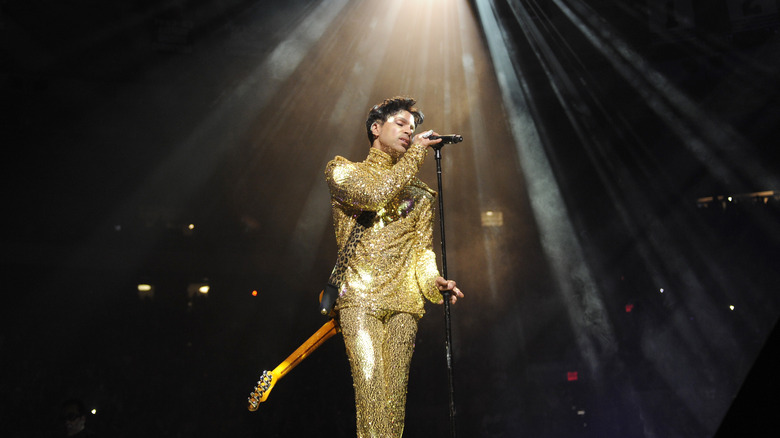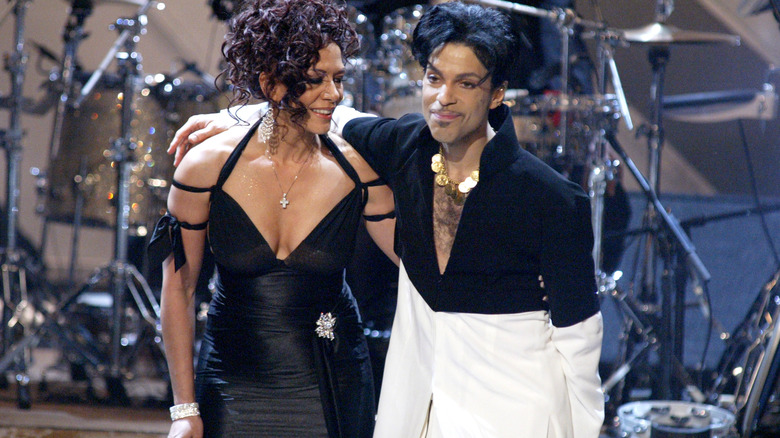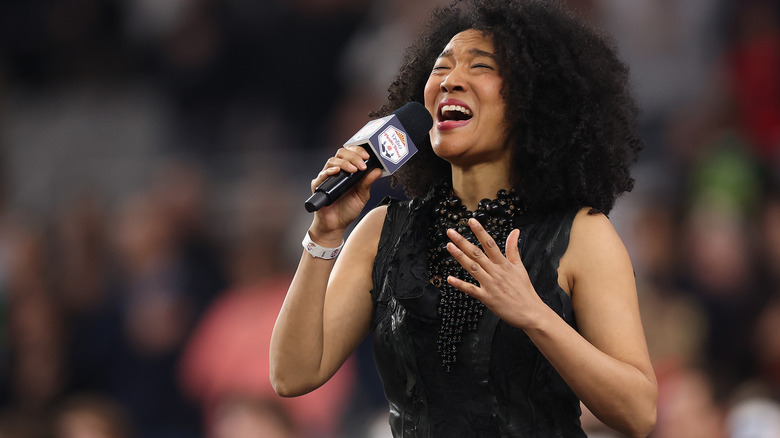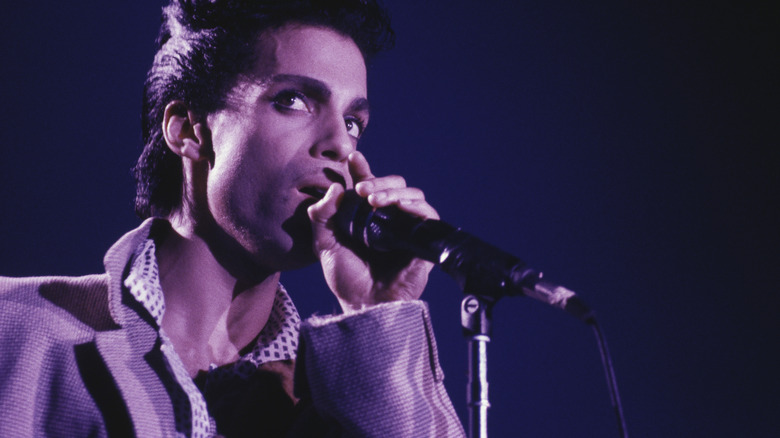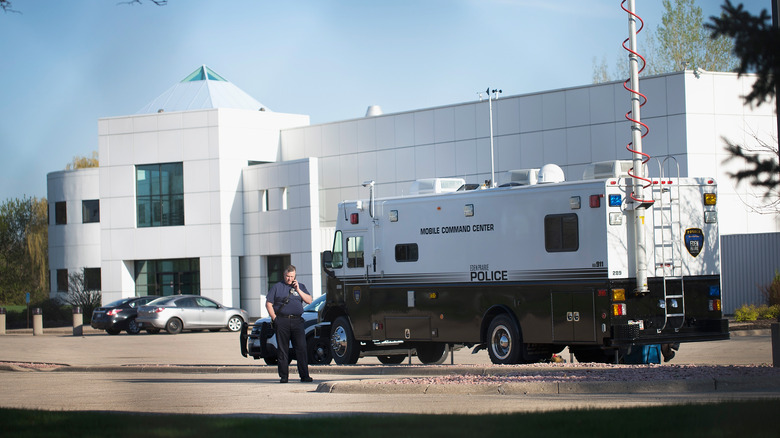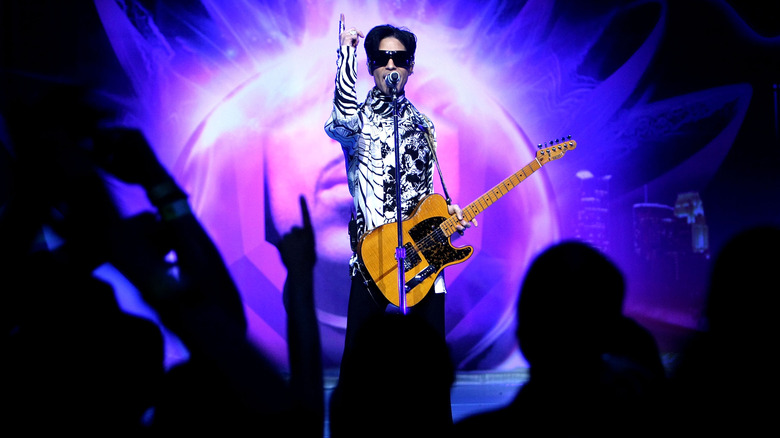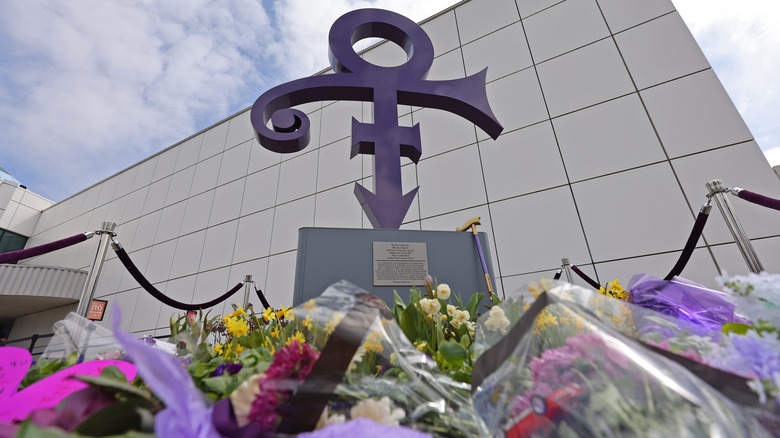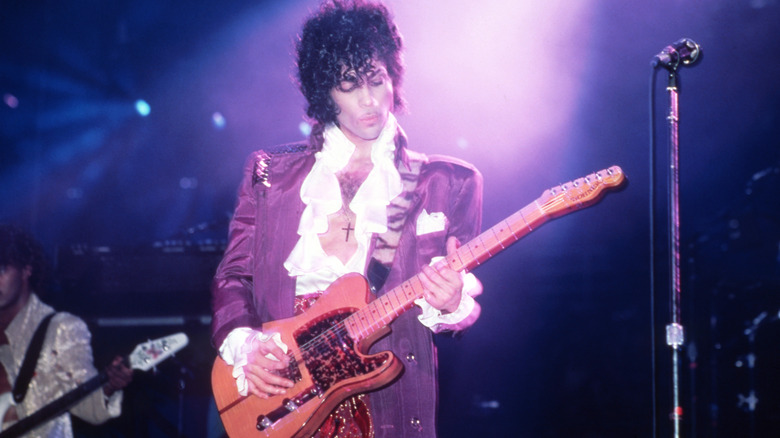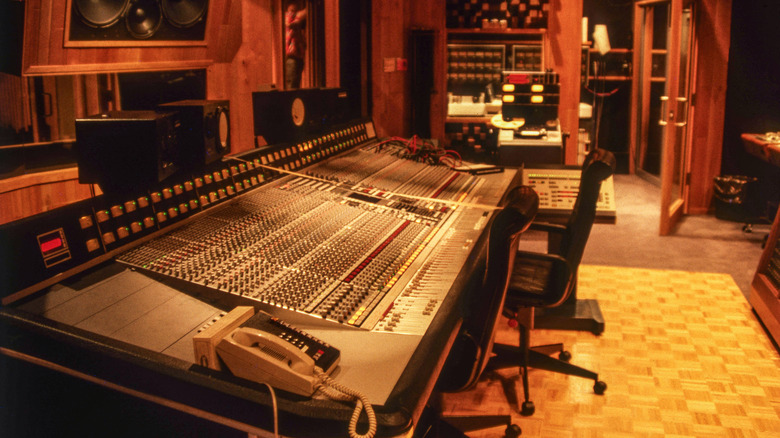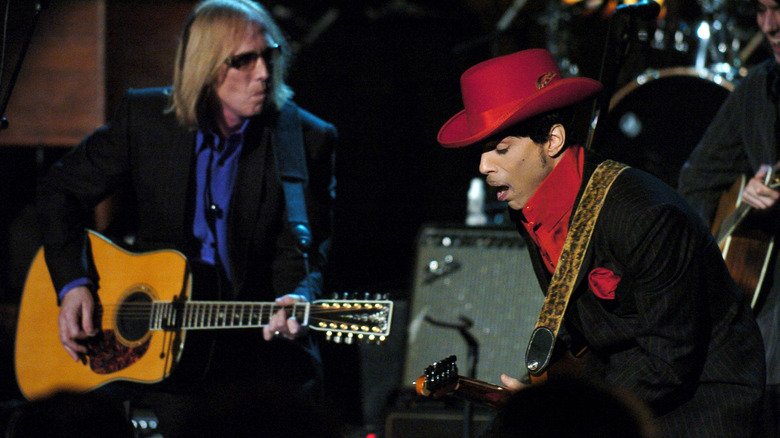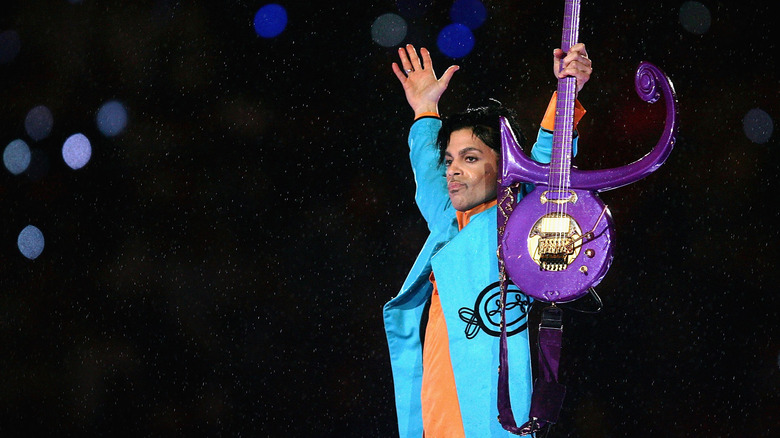Things We Learned About Prince After He Died
While there are some death announcements that we're kind of prepared to hear — including those of actors and actresses who are among Hollywood's oldest survivors — others seem to come out of left field. That was the case with Prince, the shockingly talented musician who passed away in 2016 at just 57 years old.
It wasn't just his age that made his death shocking: He had been performing just days prior, and he had been making plans to play a series of shows on what he'd dubbed his Piano & A Microphone tour. Although he had canceled one show due to what he described as a bout with the flu, there were no outward signs that there was anything amiss with the superstar. It was only after his death that an investigation put a spotlight on exactly what was going on in his life off-stage, and it was a story of old injuries, chronic pain, and the chronic use of painkillers.
The official cause of Prince's death was an accidental overdose of painkillers, and it ended up being a small but very high-profile chapter in a larger crisis. America's opioid epidemic started with the Sackler family's insistence that opioids — particularly OxyContin — weren't addictive, and by 2019, opioids had claimed around half a million lives. The story of Prince's death brought the crisis into the spotlight, so let's take a look back at what we learned about this global superstar since his tragic passing.
If you or anyone you know needs help with addiction issues, help is available. Visit the Substance Abuse and Mental Health Services Administration website or contact SAMHSA's National Helpline at 1-800-662-HELP (4357).
Longtime collaborator and friend Sheila E confirmed he suffered from chronic pain
Industry icon Sheila E knew Prince for a long time: They first played together in the late 1970s, they collaborated on her debut album, they were engaged, and although they split, they remained close friends until his death. At the time of his passing, they lived just two miles apart — and when she sat down for an interview with People the day after his death, she confirmed that he had his private struggles.
She also spoke with ET, and according to her, he had been dealing with health issues for a long time. Most of those were performance-related, she said: "I mean, you think about all the years he was jumping off those risers. They were not low — they were very, very high — and to just off that ... he had those heels on. We did a year of touring [and] for him to jump off of that — just an entire year would have messed up his knees. ... He was in pain all the time, but he was a performer," she added. Sheila E wasn't alone: Prince's half-sister, Sharon Nelson, also confirmed to ABC News that the star was in near-constant pain from a lifetime of performing.
It's easy to see actors and musicians as somehow superhuman, figures that are up on stage and in front of the camera, doing things that mere mortals can't comprehend. But Sheila E stressed that it took a toll on him: "He always gave it his all, 150% of the time."
The details of a medical emergency suffered after his final concert
Those who saw Prince before and after his final concert on April 14, 2016, said that he had said he hadn't been feeling well. Instead of attending the usual after-party, he got on his plane and headed home ... where, according to heavily redacted documents released by officials in Moline, Illinois (via The Guardian), he suffered an emergency episode that required the administration of two doses of Narcan.
In 2018, Prince's family sued the hospital where he was treated, claiming (via The New York Times) that he had been misdiagnosed during the incident that happened just days before his death. In an adjacent statement, attending doctor Nicole F. Mancha explained that Prince had refused to undergo the tests that had been recommended, and instead, left the hospital and was on his way home hours after landing in Illinois.
There were only a few other people on the plane with Prince that day, including assistant Kirk Johnson and Prince's protege, Judith Hill. In an interview with The New York Times that ran a few months after his death, Hill said that she had never seen anything of the sort happen before, had no warning, and that they had plans for getting home: "He wanted to watch 'Zootopia.' He loved those films. I was going to pull it up on my phone. He said, 'No, no, no, not here. We're going to pick a special time and place to watch that."
Longtime collaborator Judith Hill said his loved ones had convinced him to seek treatment
A few months after Prince's death, Judith Hill spoke with The New York Times to share what she had seen of his last few weeks and days. Hill — a Grammy-winning artist Prince had taken under his wing and mentored — said that she had reached out to some of those in his inner circle and made it clear that he needed more help than what he was going to have access to at the hospital he'd been moved to after overdosing in mid-fight.
Hill says that although Prince initially tried to downplay the severity of what had happened, those around him convinced him to take it seriously. "He was very cooperative that whole night, [and] serious about getting help," she said. She said that they had contacted a California-based addiction specialist named Dr. Howard Kornfeld, and that Prince agreed to undergo a series of tests. She said that he had been brutally honest about his near-death experience, telling her, "I had to fight for my life. I remember hearing your voices from afar and saying to myself, 'Follow the voices, follow the voices, get back in your body, you gotta do this."
She explained, "He did it because he was concerned, and he wanted to do the right thing for his own body. And that's the part that breaks my heart, because he was trying. He was trying."
Documents released by Minnesota courts revealed the extent of Prince's on-hand pills
The investigation into Prince's death was understandably complex, and in 2017, some of the documents relating to that investigation were made public. That included details regarding the discovery of pills that had been found in bottles scattered throughout Paisley Park (pictured), and investigators specified that they "were not contained in typical prescription pill bottles but rather, were stored in various other containers such as vitamin bottles."
Things got more confusing when investigators found some prescriptions that had been made out in the name of Kirk Johnson, Prince's longtime aide — and that's when a few different stories came out. In one, Johnson said that he had reached out to Dr. Michael Schulenberg to get prescriptions that would help alleviate some of the chronic hip pain that Prince was suffering from, and later added that when he picked up prescriptions for Prince (but in Johnson's name) the day before his death, it was a first. Schulenberg, meanwhile, said he issued the prescription in Johnson's name for privacy reasons, while his attorney later stated he had never issued a prescription to someone knowing it would be used by Prince.
That day, Johnson had picked up prescriptions for clonidine (high blood pressure/ADHD), Valium, and hydroxyzine pamoate (anxiety). The documents revealed that prescription pill bottles (including those issued in Johnson's name) for ondansetron hydrochloride (anti-nausea) and Percocet were also found. Johnson, ultimately, was found not to have procured the drugs that led to Prince's death.
Prince insisted on getting regular B12 injections
B12 is one of the many vitamins that humans need in order to survive, and interestingly, there are plenty of people who don't get enough of it — particularly vegan and vegetarians. Prince fell into one or both of those categories, and the information out there is conflicting. While there's plenty of sources out there that say Prince was vegan, there's also a number of stories out there about his absolutely epic cooking skills — particularly, scrambled eggs. (Cat Glover, Jill Jones, and Copeland all mentioned his love of eggs in an interview with GQ.)
Regardless of the precise details, it's entirely possible that Prince's largely meat-free diet meant that he was — like many others — suffering from a B12 deficiency. But what's also interesting is that a definite diagnosis was unclear, partially because after his death, it was revealed that he didn't have a regular doctor.
That bit of information was made public with the release of documents pertaining to the investigation that was conducted after his death, which also revealed the fact that his management team was tasked with arranging pre-performance B12 shots for him in whatever area he happened to have a concert scheduled for. The documents said that he used them to "feel better."
Prince's official cause of death was a fentanyl overdose
In addition to news regarding Prince's use of prescription painkillers, more information started to emerge about not only the official cause of death, but the circumstances that led to his tragic passing. Prince's autopsy report was released by the Midwest Medical Examiner's Office in June 2016, and the official cause was fentanyl toxicity. The report included the note: "The decedent self-administered fentanyl."
Fentanyl can be deadly when it's present in the blood at levels between three and 58 micrograms per liter, and Prince was found to have died with a blood concentration level of 67.8 micrograms. That was explained to be exceptionally high, and it was also reported that when fentanyl (and lidocaine) was discovered in his home, it was present in pills that had been incorrectly labeled.
The pills that actually contained fentanyl were labeled "Watson 385." What's that? The legitimate contents of pills labeled as Watson 385 are a combination of hydrocodone bitartrate and acetaminophen, which is more popularly known by the brand name Tylenol. Together, it's prescribed as a painkiller, and the investigation was never able to determine where the pills had come from. (Click here to read more about why fentanyl-laced drugs are so dangerous.)
He bought the house from Purple Rain
Movies, TV shows, and music videos have to be filmed somewhere, and when famous homes hit the open market, it can be a big deal. (We looked at what happened to that eerie house from "The Conjuring" here.) In 2015, it was announced that The Kid's house from "Purple Rain" was for sale. The price? A pretty reasonable $110,000, which came with the caveat that the property needed a decent amount of work. The house sold, but it wasn't until after Prince's death that it was revealed that he had bought it himself.
The real estate agent who arranged the sale spoke with the StarTribune to confirm that yes, he'd been behind the $117,000 purchase. Coldwell Banker's Deborah Larsen explained, "I don't think he had a plan. I think he just wanted it." Larsen said that when she got the offer from an unnamed party who wanted to buy the house sight unseen, she was pretty skeptical. It wasn't the first offer, but she knew it was the real deal with the paperwork — made out to NPG Music Publishing — went through.
The sale went through about eight months before his death, and the property sat largely untouched for a long time. In 2024, it was announced that it was remodeled and would be opening as a Prince-themed Airbnb. (Check out the ongoing debate over the actual meaning behind "Purple Rain" here.)
Prince left behind a shocking number of unreleased recordings
In 2015, The Guardian spoke with Prince's former sound engineer, Susan Rogers. She told them that she had been responsible for starting the infamous vault of unreleased recordings, nestled safely within the walls of Paisley Park. She'd started it when she started working for him in 1983, but Prince apparently hadn't had concrete plans for everything in the vault. In fact, former manager Alan Leeds said, "He said that one day he'd just burn everything.
It's maybe a good thing, then, that Prince himself had reportedly forgotten the combination for the vault, and when he died, no one else had it. That was just part of the problem, and according to professional safecracker Dave McOmie, that particular model was notoriously difficult to crack. McOmie, however, cracked it and opened an approximately 800-square-foot room packed with unreleased music. (Prince, meanwhile, has penned numerous songs that you may not have realized were written by him.)
According to McOmie, years of safecracking experience meant that he reflexively didn't look inside at first — but, he said (via Ultimate Classic Rock), he got the go-ahead. "Now, by bank standards, [the safe] is on the large side. And yet there was hardly any room in the vault, because it was just jam-packed with these industrial shelving units, and every one of them was packed bottom to top with tapes." Some material has been released since, including the release of "7(E Flat Version)" and "All a Share Together Now" in 2023.
That epic Hall of Fame performance wasn't rehearsed
One of Prince's most famous performances came at the 2004 Rock & Roll Hall of Fame inductions. Prince was there for his own induction, but it was during a tribute to George Harrison that he stepped up to play an incredible solo on "My Guitar Gently Weeps." Alongside Tom Petty, Harrison's son, Dhani, Steve Winwood, Jeff Lynne, and Marc Mann, Prince wrapped up the tribute with a shocking, almost otherworldly solo. After his death, those who were there that day spoke to The New York Times about how it all came together — and revealed that they hadn't rehearsed it, and had no idea what was going to unfold on stage.
It was ceremony director and producer Joel Gallen who arranged to have Prince there, and explained that when they rehearsed, Prince was there ... and stood by as others took on the solos. He volunteered for the end solo, and that was sort of it. "They never rehearsed it, really," Gallen said. "Never showed us what he was going to do, and he left, basically telling me, the producer of the show, not to worry. And the rest is history."
Petty also weighed in on the night, saying that the atmosphere was electric. He added that he had been thinking about Prince in the days before his death, saying, "I almost told myself I was going to call him and just see how he was. I'm starting to think you should just act on those things all the time."
He didn't have a will or plans for his estate
When Prince died, it was of course unexpected, but it also revealed just how important estate planning is: In the midst of grieving, it left major questions over what was going to happen to his estate. It took a full six years for the estate to be settled.
In the end, it was divided between Prince Legacy LLC and Prince OAT Holdings LLC, which is a whole other set of complicated ... and to say it was complicated is a massive understatement. In addition to things like property and cash, there were things like copyrights and intellectual property to be considered, and the lack of a will or executor meant that Prince's hard work and beloved music wasn't, perhaps, handed out to the people he would have hoped it would go to.
And in the end, that's a terrible kind of irony. Prince famously spent decades standing up for the rights of the artist, going up against some of the biggest record companies in the business over issues of artistic freedom, royalties, ownership of master recordings, and control over creations. Later, he went toe-to-toe with the internet, too, insisting on pulling songs from websites and ordering an end to the distribution of things like videos that used his music in the background. Prince spent his entire life trying to ensure control of his music, but in the end, it was at the mercy of the courts.
